可以作后置定语的各种成分
动词不定式做后置定语的五种情况
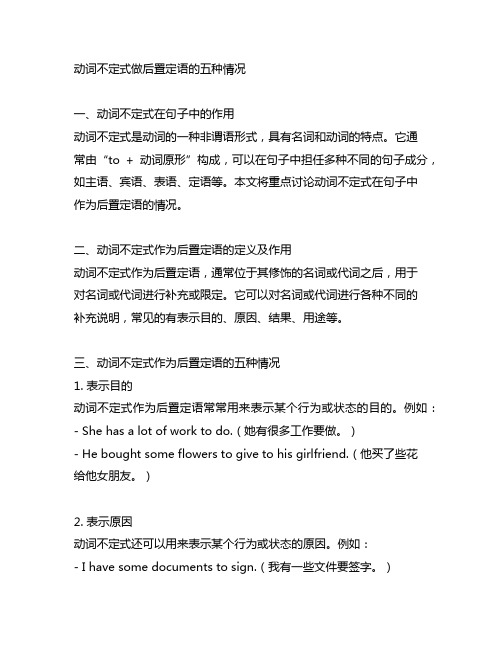
动词不定式做后置定语的五种情况一、动词不定式在句子中的作用动词不定式是动词的一种非谓语形式,具有名词和动词的特点。
它通常由“to + 动词原形”构成,可以在句子中担任多种不同的句子成分,如主语、宾语、表语、定语等。
本文将重点讨论动词不定式在句子中作为后置定语的情况。
二、动词不定式作为后置定语的定义及作用动词不定式作为后置定语,通常位于其修饰的名词或代词之后,用于对名词或代词进行补充或限定。
它可以对名词或代词进行各种不同的补充说明,常见的有表示目的、原因、结果、用途等。
三、动词不定式作为后置定语的五种情况1. 表示目的动词不定式作为后置定语常常用来表示某个行为或状态的目的。
例如:- She has a lot of work to do.(她有很多工作要做。
)- He bought some flowers to give to his girlfriend.(他买了些花给他女朋友。
)2. 表示原因动词不定式还可以用来表示某个行为或状态的原因。
例如:- I have some documents to sign.(我有一些文件要签字。
)- They have a lot of homework to finish.(他们有很多作业要完成。
)3. 表示结果动词不定式还可以表示某个行为或状态的结果。
例如:- He is too tired to walk.(他太累了,无法走路。
)- The book is too heavy for me to carry.(这本书太重了,我搬不动。
)4. 表示用途动词不定式还可以表示某个事物的用途。
例如:- I need a pen to write with.(我需要一支笔来写字。
)- This tool is used to cut wood.(这个工具用来切木头。
)5. 表示限制或条件动词不定式还可以用来限制或表示条件。
例如:- I have only a few minutes to spare.(我只有几分钟的空闲时间。
英语四种后置定语的结构
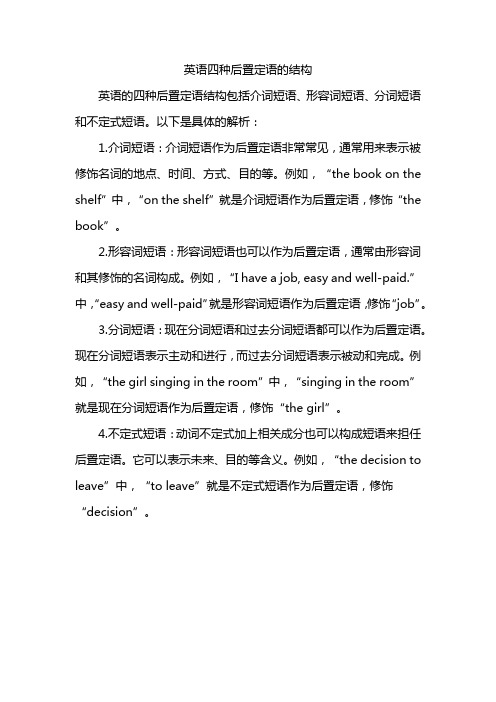
英语四种后置定语的结构
英语的四种后置定语结构包括介词短语、形容词短语、分词短语和不定式短语。
以下是具体的解析:
1.介词短语:介词短语作为后置定语非常常见,通常用来表示被修饰名词的地点、时间、方式、目的等。
例如,“the book on the shelf”中,“on the shelf”就是介词短语作为后置定语,修饰“the book”。
2.形容词短语:形容词短语也可以作为后置定语,通常由形容词和其修饰的名词构成。
例如,“I have a job, easy and well-paid.”中,“easy and well-paid”就是形容词短语作为后置定语,修饰“job”。
3.分词短语:现在分词短语和过去分词短语都可以作为后置定语。
现在分词短语表示主动和进行,而过去分词短语表示被动和完成。
例如,“the girl singing in the room”中,“singing in the room”就是现在分词短语作为后置定语,修饰“the girl”。
4.不定式短语:动词不定式加上相关成分也可以构成短语来担任后置定语。
它可以表示未来、目的等含义。
例如,“the decision to leave”中,“to leave”就是不定式短语作为后置定语,修饰“decision”。
英语后置定语的详细用法

单个词做后置定语
02
Байду номын сангаас
(一)形容词做后置定语
2.英语中有些以a为词首的形容词做定语时,均放在被修饰语后面。如:alone, alike, afraid, , ashamed, awake 等 The girl asleep is my younger sister. He is the greatest writer alive.
我的句子:那个被Tom打的男孩是杨清。(beat)
named
written
3.动词不定式做后置定语: 与被修饰成分之间表示不同的语义关系: (1)表示动宾关系(2)表示主谓关系 (3)表示修饰关系 (4)表示同位关系
(1)表示动宾关系 被修饰的名词为动词不定式to do的直接宾语。 I have a lot of work to do today. He had a big family to support. I don’t have a house to live in . I don’t have a pen to write with. I don’t have a piece of paper to write on
He looked at the street full of cars(形容词短语)
我的句子:
副词做后置定语时一般表示时间、地点等. The weather here is very nice. The building around are modern .
(二)副词做后置定语
Is there anybody wounded? There is no money left . 我的句子:这儿的食物很美味。(副词) 我没有剩余的钱了。(过去分词)
英语中常见的几种定语后置的情况(附练习及答案)

英语中常见的几种定语后置的情况(附练习及答案)在英语中,定语多数情况下放在被修饰的成分之前,称为前置定语。
但有时是词或短语作定语时,其位置要放在被修饰的成分之后,称为后置定语。
常见的后置定语有以下几种情况:一、介词短语作定语(1)Who are the man and the woman (beside)the house?房屋旁边的那个男人和妇女是谁?(2)The red one (on the right)looks very nice,doesn't it?右边的红色的那件看上去很好,不是吗?(3)The lamp (in the room )gave poor light. 房间里的灯发出微弱的光。
(4)the map on the wall 墙上的地图the south side of the Changjiang River 长江南岸the development of China 中国的发展the birds in the tree树上的小鸟(5)He lives in a house(with big trees all around it).They often eat dumplings (with seafood in them).The girl (with big eyes 〉is Jim's sister.Look at the man(with funny glasses).(7)The bird (in the tree)is singing.The man (in black )is Mr. Brown, our physic teacher.The lady(in the car)is from France.The man (in the hat )invited me.The girl(in a red coat )is my sister.(8)The man (under the tree)is my father.(9)The boy (in blue )is my brother(10)The book(by my father)is my favorite.二、不定式(短语)作定语①He told me he had an important meeting (to attend).他对我说,他有个重要会议要参加。
后置定语种种

highway which led into the mountains.
In winter you have to play sports indoors. 冬季里你不得不在室内运动。
3、现在分词短语做后置定语。 英语中现在分词做定语可以前置,也可以后置。
但现在分词短语做定语时,一定放在被修饰成分 的后面,构成后置定语。 例如:They built a highway leading into the mountains. 他们修建了一条通往山里的公路。
than twelve feet high with a narrow entrance. 他在岩石中找到一个好地方,十二英尺多高,还 有一个狭窄的入口。
Yesterday, a Mr. Brown, 28 years old, came to visit you. 昨天,一位28岁的自称叫布朗先生的人来拜访过你。
(时间)八点钟的太阳最灿烂。
The weather in the north is colder than that in the south.
(地点)北方的天气南方的天气冷。
People in the world play basketball. (范围)世界上的人们都打篮球。
Products from China are very popular in the US. (来源)来自中国的产品深受美国人的欢迎。
The boy with glasses on the nose is my friend. (描述)那个戴眼镜的男孩是我的朋友。
英语中形容词作后置定语的十种情况

英语中形容词作后置定语的十种情况
1. 名词作主语的形容词后置。
例如:The movie is interesting.
2. 名词作宾语的形容词后置。
例如:I find the book boring.
3. 物主代词作宾语的形容词后置。
例如:He lost his key.
4. 数词作宾语的形容词后置。
例如:She has two dogs.
5. 不定代词作宾语的形容词后置。
例如:I saw something strange.
6. 感官动词(如see、hear、smell、feel等)后置的形容词。
例如:
I heard something strange.
7. 整体名词后置的形容词。
例如:His shirt is red.
8. 序数词后置的形容词。
例如:He is the first person to arrive.
9. 代词one或ones后置的形容词。
例如:I want the blue one.
10. 由两个或更多形容词组成的形容词短语后置。
例如:It was a long and tiring day.。
高中英语 定语从句总结定语后置的总结
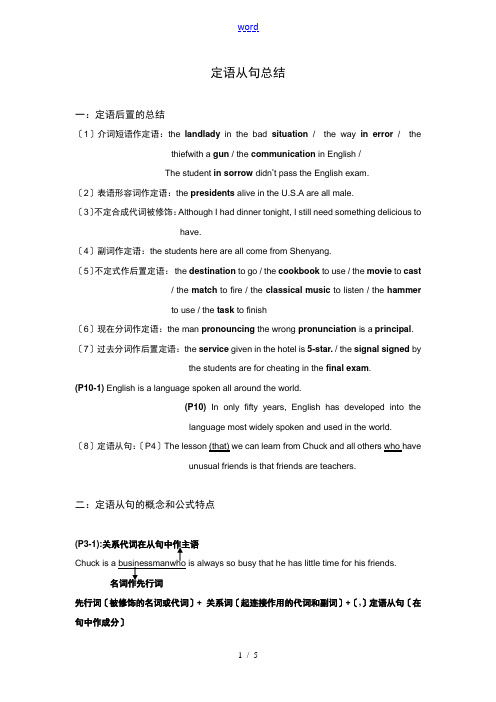
定语从句总结一:定语后置的总结〔1〕介词短语作定语:the landlady in the bad situation/ the way in error/ thethiefwith a gun / the communication in English /The student in sorrow didn’t pass the English exam.〔2〕表语形容词作定语:the presidents alive in the U.S.A are all male.〔3〕不定合成代词被修饰:Although I had dinner tonight, I still need something delicious tohave.〔4〕副词作定语:the students here are all come from Shenyang.〔5〕不定式作后置定语:the destination to go / the cookbook to use / the movie to cast/ the match to fire / the classical music to listen / the hammerto use / the task to finish〔6〕现在分词作定语:the man pronouncing the wrong pronunciation is a principal. 〔7〕过去分词作后置定语:the service given in the hotel is 5-star. / the signal signed bythe students are for cheating in the final exam.(P10-1) English is a language spoken all around the world.(P10) In only fifty years, English has developed into thelanguage most widely spoken and used in the world.〔8〕定语从句:〔P4〕The lesson (that) we can learn from Chuck and all others who haveunusual friends is that friends are teachers.二:定语从句的概念和公式特点(P3-1):关系代词在从句中作主语Chuck is a businessmanwho is always so busy that he has little time for his friends.先行词〔被修饰的名词或代词〕+ 关系词〔起连接作用的代词和副词〕+〔,〕定语从句〔在句中作成分〕三:定语从句的分类When I took the money from her grandfather, I looked back at the girl, who was giving me the prettiest, largest smile (that)I have ever seen.限定性定语从句和非限定性定语从句的区别1:限定性没有逗号,非有逗号。
英语后置定语的详细用法

(二)副词做后置定语 副词做定语时一般放在名词之后 在意义上表示时间、地点等。 例如:
The weather here is very nice. 这里的天气很好
People in the world play basketball. (范围)世界上的人们都打篮球。
His love for his country is very great. (动宾)他很热爱自己的国家。
The city of New York is very large. (同位)纽约城很大。
他是当代最伟大的作家。
这些词在有一状语修饰时,也可以做前置定语。
例如:
熟睡的孩子们
the fast asleep children 完全醒着的病人
Fast:紧紧地;彻底地
the wide awake patient 一个有点惊恐的士兵
Wide:充分地
a somewhat afraid soldier
It's the only solution possible. 这是唯一可能采取的解决办法。 Are there any tickets available?还有票吗? That's the only star visible now.那是颗现在唯一可见的星。
3.形容词修饰 由any-,every-, some-等跟-body, -one,thing构成的 不定代词时,一般放在其后。
(3)表示修饰关系
动词不定式对其修饰的成分起一种描绘阐述作用。
例如:
It’s already time to start planting trees. 已经到了植树的季节。
定语后置句的五种类型

定语后置句的五种类型定语是润饰或限制名词或名词性短语的成分,在现代汉语中,一般放在中间语之前,而在古代汉语中,有时为了强折衷凸起定语,要把它放到中间语的后面,这种语法现象叫做“定语后置”.定语后置句是文言文的一种主要句式,它一般有五种情势.1.定语放在中间语后,用“者”字结尾,构成“中间语+后置定语+者”的格局.例如:①计不决,求人可使报秦者.(《廉颇蔺相如传记》)②太子及来宾知其事者,皆白衣冠以送之.(《刺客传记》)③群臣吏平易近能面刺寡人之过者,受上赏.(《邹忌讽齐王纳谏》)④人马烧灭顶者甚众.(《赤壁之战》)⑤亦雁荡具体而微者.(《雁荡山》)2.在中间语和后置定语之间加上“之”,构成“中间语+之+后置定语”的格局.例如:①蚓无帮凶之利,筋骨之强……(《劝学》)②仰视宇宙之大,俯察品类之盛.(《兰亭集序》)③苟以世界之大,而从六国破亡之故事,是又在六国下矣.(《六国论》)④人又谁能以身之察察,受物之汶汶者乎?(《屈原传记》)⑤带长铗之陆离兮,冠切云之崔嵬.(《涉江》)3.在中间语和后置定语之间加“之”,再用“者”字结尾,构成“中间语+之+后置定语+者”的格局.例如:①石之铿然有声者,地点皆是也.(《石钟山记》)②国之孺子之游者(在外肄业的年青人),无不餔也……(《勾践灭吴》③疆土之新辟者,移种平易近以居之,钱粮之沉重者,酌今昔而减之……(《治平篇》)4.在中间语和后置定语之间加“而”,再用“者”字结尾,构成“中间语+而+后置定语+者”的格局.例如:①大阉之乱,绅耆而能不轻易其志者,四海之大,有几人欤?(《五人墓碑记》)②此四者,世界之穷平易近而无告者(这四种人,是世界无依无靠的穷鬼).(《孟子·梁惠王下》)5.数目词用作定语,大多放在中间语的后面,格局为“中间语+数(量)词.例如:①我持白璧一双,欲献项王;玉斗一双,欲与亚父.(《鸿门宴》)②吏二缚一人诣王.(《晏子使楚》)③比至陈,车六七百乘,骑千余,卒数万人.(《陈涉世家》)值得留意的是,并不是所有相符上述格局的句子都是定语后置句,只有强折衷凸起定语的句子,才有可能是定语后置句.例如:①诸将吏敢复有言当迎操者,与此案同!(《赤壁之战》)乍看句中加点的文字,相符“中间语+后置定语+者”的格局,但句中的“者”不是定语后置的标记词,而是用在假设分句后,以提醒下文.此句应译作:众武将文官若有敢再提应该迎降曹操的,成果将与这个奏案一样.②吾妻之美我者,私我也(《邹忌讽齐王纳谏》)句中加点的文字概况上相符“中间语+之+后置定语+者”的格局,但现实上并不是定语后置句,“之”的感化是用在主谓之间,撤消句子的自力性,“者”的感化是放在分句的句末,引出原因.此句应译为:我的老婆认为我英俊,是因为她偏心我.*牛刀小试*1.下列各句的句式特此外一项是()A.予一以贯之.(出自《孔子世家》,以下出处雷同)B.人之不我信也.C.不容何病D.弟子及鲁人往从冢而家者百有余室【答案】D[解析]D项为定语后置句,其余为宾语前置句.2.与“认为凡是州之山川有异态者,皆我有也”(《始得西山宴纪行》)一句的句式特色雷同的一项是()A.宜乎,苍生之谓我爱也(《齐桓晋文之事》)B.今兵士还者及关羽水军精甲万人(《赤壁之战》)C.富者曰:“子何恃而往?”(《为学》)D.青,取之于蓝,而青于蓝(《劝学》)【答案】B[解析]例句和B句皆为定语后置句.A句是主谓倒置句,C句是宾语前置句,D句是状语后置句.。
后置定语和定语从句
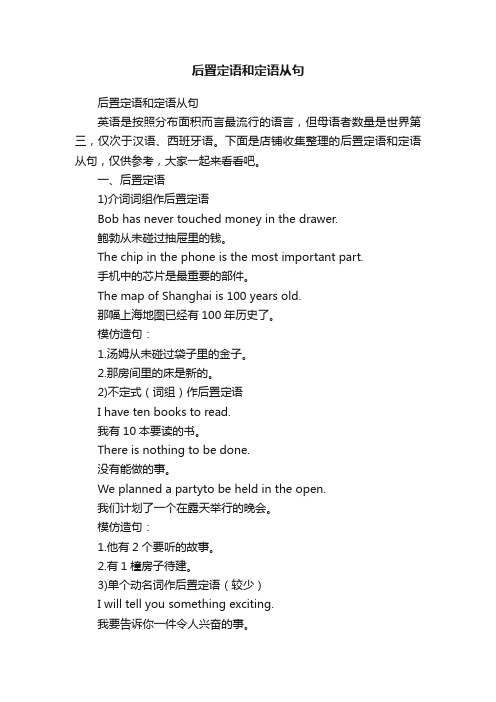
后置定语和定语从句后置定语和定语从句英语是按照分布面积而言最流行的语言,但母语者数量是世界第三,仅次于汉语、西班牙语。
下面是店铺收集整理的后置定语和定语从句,仅供参考,大家一起来看看吧。
一、后置定语1)介词词组作后置定语Bob has never touched money in the drawer.鲍勃从未碰过抽屉里的钱。
The chip in the phone is the most important part.手机中的芯片是最重要的部件。
The map of Shanghai is 100 years old.那幅上海地图已经有100年历史了。
模仿造句:1.汤姆从未碰过袋子里的金子。
2.那房间里的床是新的。
2)不定式(词组)作后置定语I have ten books to read.我有10本要读的书。
There is nothing to be done.没有能做的事。
We planned a partyto be held in the open.我们计划了一个在露天举行的晚会。
模仿造句:1.他有2个要听的故事。
2.有1橦房子待建。
3)单个动名词作后置定语(较少)I will tell you something exciting.我要告诉你一件令人兴奋的事。
The dog barking is not a dog biting.叫狗不咬人。
模仿造句:1.他要给你一本有趣的书。
2.爱说大话的人不太靠谱。
4)动名词词组作后置定语The bady moved towards the small dog lying on the floor.婴儿爬向躺在地板上的小狗。
The girl running atthe head is my sister.跑在前头的女孩是我的姐姐。
No one is responsible for the water flowing out in vain.没有人对白白流走的水负责。
前置定语和后置定语

前置定语和后置定语定语是在句子中修饰名词或代词的成分,它可以出现在被修饰词的前面或后面,前者称为前置定语,后者称为后置定语。
在汉语中,定语的位置可以灵活变动,但不同位置的定语对句子的意义和表达方式有不同的影响。
一、前置定语前置定语是位于被修饰词之前的定语。
它可以是形容词、名词、动词-的短语和动词短语等。
前置定语的使用可以使句子更加明确和具体。
1. 形容词作前置定语形容词作前置定语时,通常用来修饰名词的性质、特征等。
例如:(1)美丽的花朵在阳光下绽放。
(2)高大的建筑物耸立在城市中。
2. 名词作前置定语名词作前置定语时,主要是用来修饰另一个名词,起到限定的作用。
例如:(1)学生会组织了一次远足活动。
(2)水资源是人类生活的重要组成部分。
3. 动词-的短语作前置定语动词-的短语作前置定语时,通常用来修饰名词。
例如:(1)正在进行的会议需要大家积极参与。
(2)新建的学校将提供更好的教育条件。
4. 动词短语作前置定语动词短语作前置定语时,常常表示某一动作或状态。
例如:(1)掌声雷动的演讲结束后,观众们纷纷起身鼓掌。
(2)完成作业的学生可以开始休息了。
二、后置定语后置定语是位于被修饰词之后的定语。
它可以是形容词、介词短语、分词或从句等形式,主要用来进一步修饰名词的属性、状态或发展等。
1. 形容词作后置定语形容词作后置定语时,常常用来修饰名词。
例如:(1)心情愉快的人更容易与他人建立良好的关系。
(2)他是一个很有责任心的医生。
2. 介词短语作后置定语介词短语作后置定语时,常常表示某种关系或特征。
例如:(1)骑着自行车上学的学生们早起很辛苦。
(2)带着礼物来的客人让我们感到非常意外。
3. 分词作后置定语分词作后置定语时,通常表示被修饰词所处的状态、特征或发展。
例如:(1)受伤的小鸟在树上哀鸣着。
(2)被雨淋湿的书籍使我很不开心。
4. 从句作后置定语从句作后置定语时,常常用来修饰名词,扩展句子的意义。
例如:(1)我们正在阅读的书籍是老师推荐的。
英语中哪些句子成分作后置定语

英语中哪些句子成分作后置定语后置定语1)单个过去分词充当后置定语(较少)The power cut is going to last for some time.断掉的电,好一阵子不会来。
The people concerned include class 1 and class 2. 相关的人包括一班和二班。
Jielun Zhou is not among the singers involved. 周杰伦不在牵涉的歌手之列。
模仿造句:1.杀好的鸡突然不见了。
2.相关的研究人员与学生都参加了会议。
2)过去分词词组作后置定语Let me answer the question mentioned just now. 我来回答刚才提到的问题。
Who is the boy called Tom.谁是叫汤姆的男孩?There were two kites made of cloth.有两只用布做的风筝。
模仿造句:1.你还记得昨天提到的那个问题吗?2.她就是叫珍妮的女孩。
3)单个形容词作后置定语I will use any means availale.我将利用任何能用的手段。
Heis the only survivor alive.他是唯一还活着的幸运者。
Anything useful has its value.任何有用的东西都有价值。
模仿造句:1.他会使用任何能用的技能。
2.Tim是第二位仍活着的幸存者。
8)形容词词组作后置定语I have got a dictionary about 300 millimeters thick.我买了一本厚300毫米的词典。
He is the man responsible for this building.他是负责这栋建筑物的人。
I need two men good at swimming.我们需要两位擅长游泳的男子。
模仿造句:1.我看出一条三条腿的狗。
2.他们需要5个擅长踢足球的人。
后置定语的用法总结

后置定语的用法总结后置定语的用法总结对于语言学习者而言,掌握各种语法结构是非常重要的。
其中,后置定语作为一种常见的修饰方式,对于增强句子的表达能力和表达深度起着重要作用。
本文将对后置定语的用法进行总结,以帮助读者更好地理解和运用这一语法结构。
一、后置定语的定义及作用后置定语指的是紧跟在所修饰名词或代词之后的修饰成分。
它通过加强名词或代词的词义,对其进一步进行解释、说明或具体化,从而使句子更加丰满和具体。
后置定语可以是形容词、分词、介词短语、从句等形式。
通过后置定语的使用,我们可以更加详细地描述一个事物或人,提供更多的细节信息,使句子更加生动有趣。
二、形容词作后置定语形容词作后置定语时,常用于描述名词的特征、性质或状态。
它通常跟在名词之后,用来进一步修饰或补充该名词的信息。
例如:1. 一个无忧无虑的少年2. 一个幸福快乐的家庭在上述例子中,形容词“无忧无虑”和“幸福快乐”作为后置定语,进一步补充描述了少年和家庭的特征。
通过使用形容词作后置定语,可以增强句子的表达力,使其更加生动。
三、分词作后置定语分词作后置定语时,常用于描述名词发出的动作或状态。
分词通常是现在分词或过去分词形式,用来对名词进行修饰和补充信息。
例如:1. 一只飞翔的鸟2. 摇摇晃晃的迪斯科舞池在上述例子中,分词“飞翔的”和“摇摇晃晃的”作为后置定语,进一步描述了鸟和迪斯科舞池的动作和状态。
通过使用分词作后置定语,可以使句子更加生动有趣。
四、介词短语作后置定语介词短语作后置定语时,常用于描述名词的位置、方向、来源等。
介词短语位于名词之后,用来补充说明名词的相关信息。
例如:1. 一座位于山脚下的小村庄2. 拿着一本来自法国的书在上述例子中,介词短语“位于山脚下的”和“来自法国的”作为后置定语,进一步描述了村庄和书的位置和来源。
通过使用介词短语作后置定语,可以使句子更具体且富有细节。
五、从句作后置定语从句作后置定语时,通常用于进一步解释、说明名词所表示的事物或人。
后置定语的用法总结
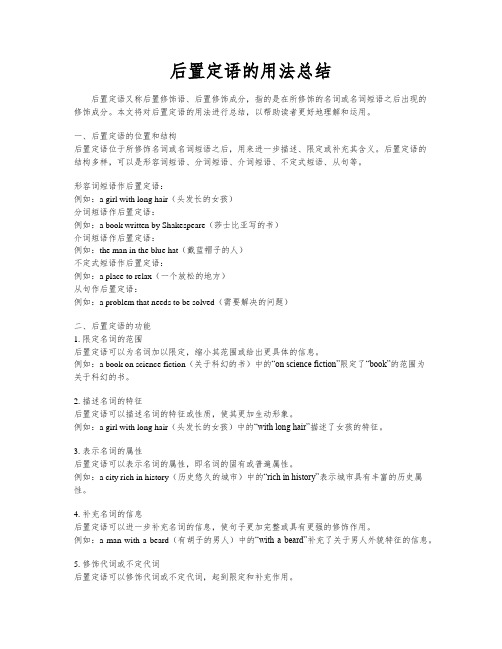
后置定语的用法总结后置定语又称后置修饰语、后置修饰成分,指的是在所修饰的名词或名词短语之后出现的修饰成分。
本文将对后置定语的用法进行总结,以帮助读者更好地理解和运用。
一、后置定语的位置和结构后置定语位于所修饰名词或名词短语之后,用来进一步描述、限定或补充其含义。
后置定语的结构多样,可以是形容词短语、分词短语、介词短语、不定式短语、从句等。
形容词短语作后置定语:例如:a girl with long hair(头发长的女孩)分词短语作后置定语:例如:a book written by Shakespeare(莎士比亚写的书)介词短语作后置定语:例如:the man in the blue hat(戴蓝帽子的人)不定式短语作后置定语:例如:a place to relax(一个放松的地方)从句作后置定语:例如:a problem that needs to be solved(需要解决的问题)二、后置定语的功能1. 限定名词的范围后置定语可以为名词加以限定,缩小其范围或给出更具体的信息。
例如:a book on science fiction(关于科幻的书)中的“on science fiction”限定了“book”的范围为关于科幻的书。
2. 描述名词的特征后置定语可以描述名词的特征或性质,使其更加生动形象。
例如:a girl with long hair(头发长的女孩)中的“with long hair”描述了女孩的特征。
3. 表示名词的属性后置定语可以表示名词的属性,即名词的固有或普遍属性。
例如:a city rich in history(历史悠久的城市)中的“rich in history”表示城市具有丰富的历史属性。
4. 补充名词的信息后置定语可以进一步补充名词的信息,使句子更加完整或具有更强的修饰作用。
例如:a man with a beard(有胡子的男人)中的“with a beard”补充了关于男人外貌特征的信息。
英语后置定语语法归纳

英语后置定语语法归纳在复合句中,修饰某一名词或代词的从句叫作定语从句。
定语是用来限定、修饰名词或代词的,是对名词或代词起修饰、限定作用的词、短语 (动词不定式短语、动名词短语和分词短语) 或句子,汉语中常用“……的”表示。
下面就是小编给大家带来的英语后置定语语法归纳,希望大家喜欢!定语主要由形容词担任,此外,名词,代词,数词,分词,副词,不定式以及介词短语也可以担任,也可以由一个句子来担任。
单词作定语时通常放在它所修饰的词之前,作前置定语。
短语和从句作定语时则放在所修饰的词之后,作后置定语。
在初中阶段我们常见的几种后置定语如下:当被修饰词为复合不定代词 something, anything, nothing,everything ; somebody, anybody, nobody, everybody ; someone,anyone, everyone, no one 时,修饰语常位于被修饰的不定代词之后。
(1) Do you have anything else to say about it?关于这件事,你还有什么要说的吗?(2) I have something important to tell you.我有些重要的事情要告诉你。
(3)Someone important will give the students a lecture on how to learn English well.今天下午,一位重要的人物将给学生们做一场有关如何学好英语的报告。
修饰疑问词 what, which, who, whose, whom, when, where,why, how 时,修饰语要后置。
(1) What important would you like to talk about?你想谈论什么重要的事情?(2) What else would you like to eat?你还想吃什么?(3) Where new have they decided to visit?他们决定到哪些没有去过的地方参观?enough (a.) 修饰名词时既可以在名词前,也可以在名词后。
可以做后置定语的结构

可以做后置定语的结构后置定语顾名思义就是放在被修饰词的后面。
可以分为以下几类:1、形容词做后置定语1)英语中有些以a为词首的形容词做定语时,均放在被修饰语后面。
例如:The girl asleep soundly is my younger sister.正熟睡的小女孩是我的小妹妹。
2) 以后缀-able 和-ible 结尾的形容词,在意义上有强烈的谓语色彩和被动意义时,也往往后置。
例如:He is the only person reliable.他是唯一可信赖的人。
3) 形容词修饰不定代词时,一般放在其后。
例如:I’d like something cheaper.我想买些便宜的东西。
4) 形容词短语做修饰语时,往往后置。
例如:He looked at the street full of cars.他看着车辆拥挤的街道。
2、副词做后置定语副词做定语时一般放在名词之后,在意义上表示时间、地点等。
例如:The weather here is very nice.这里的天气很好。
3、现在分词短语做后置定语英语中现在分词做定语可以前置,也可以后置。
但现在分词短语做定语时,一定放在被修饰成分的后面,构成后置定语。
例如:They built a highway leading into the mountains.他们修建了一条通往山里的公路。
现在分词短语做后置定语,在意义上相当于一个定语从句。
但在转换时,要注意动词的主语和时态。
例如上述两句可转化为:They built a highway which led into the mountains.4、过去分词短语做后置定语过去分词短语做后置定语时,表示被动意义、完成意义或状态意义。
例如:What’s the language spoken in that area?那个地区讲什么语言?5、动词不定式做后置定语动词不定式做后置定语与被修饰成分之间表示不同的语义关系。
英语后置定语语法归纳
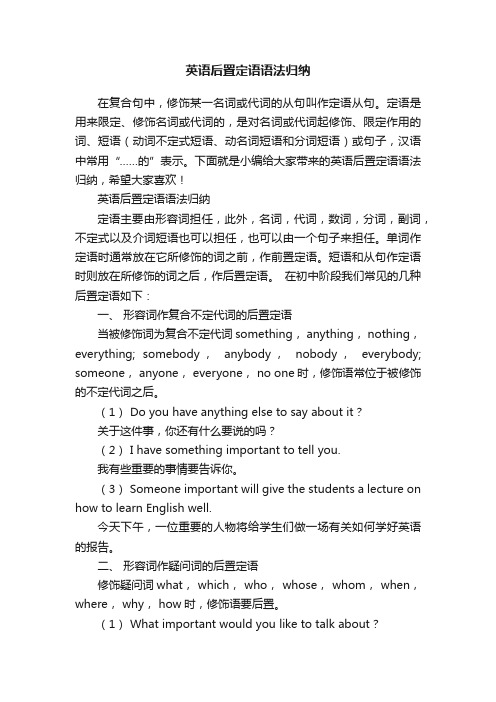
英语后置定语语法归纳在复合句中,修饰某一名词或代词的从句叫作定语从句。
定语是用来限定、修饰名词或代词的,是对名词或代词起修饰、限定作用的词、短语(动词不定式短语、动名词短语和分词短语)或句子,汉语中常用“……的”表示。
下面就是小编给大家带来的英语后置定语语法归纳,希望大家喜欢!英语后置定语语法归纳定语主要由形容词担任,此外,名词,代词,数词,分词,副词,不定式以及介词短语也可以担任,也可以由一个句子来担任。
单词作定语时通常放在它所修饰的词之前,作前置定语。
短语和从句作定语时则放在所修饰的词之后,作后置定语。
在初中阶段我们常见的几种后置定语如下:一、形容词作复合不定代词的后置定语当被修饰词为复合不定代词something, anything, nothing,everything; somebody,anybody,nobody,everybody; someone, anyone, everyone, no one时,修饰语常位于被修饰的不定代词之后。
(1) Do you have anything else to say about it?关于这件事,你还有什么要说的吗?(2) I have something important to tell you.我有些重要的事情要告诉你。
(3) Someone important will give the students a lecture on how to learn English well.今天下午,一位重要的人物将给学生们做一场有关如何学好英语的报告。
二、形容词作疑问词的后置定语修饰疑问词what, which, who, whose, whom, when,where, why, how时,修饰语要后置。
(1) What important would you like to talk about?你想谈论什么重要的事情?(2) What else would you like to eat?你还想吃什么?(3) Where new have they decided to visit?他们决定到哪些没有去过的地方参观?三、 enough作后置定语enough(a.)修饰名词时既可以在名词前,也可以在名词后。
英语后置定语的详细用法

2.形容词短语做修饰语时,往往后置。 例如:
He looked at the street full of cars. 他看着车辆拥挤的街道
Italian is a Language very difficult to learn. 意大利语是一门非常难学的语言。
She has a garden much larger than yours . 她的花园比你的花园大得多。
形容词短语
3.单个词
介词短语
一.定语从句做后置定语 用法: 1.构成:先行词+关系代/副词+从句 2. 引导定语从句的关联词包括关系代词和关系副词。 关系代词:that, which, whose, who, whom, as; 关系副词:when, where, why。
3. 关系代词和关系副词在定语从句中充当一定的句子成份。
(4) 表示同位关系 不定式和被修饰的名词处于平行关系 只对其起一种解说作用。 例如:
Soon came the order to start the general attack. 很快下达了发起总攻的命令。
We got no instructions to leave the city. 我们没有接到离开这座城市的指示。
wounded, injured, concerned, conducted, done, held, arranged, planned, suggested, finished, completed, arrested, given, fallen, constructed, missed等等。 • 1) Is there anybody injured?有人负伤吗? • 2) The money left is not enough for so many people to live through. • 剩余的钱不够这么多人用的。 • 3) She liked all the courses offered. • 她对所开的课程都很喜欢。 • 4) The experience gained will be of great value to us. • 取得的经验将我们很有价值。
高考英语复习后置定语语法总结

高考英语一轮复习——后置定语语法总结在复合句中,修饰某一名词或代词的从句叫作定语从句。
定语是用来限定、修饰名词或代词的,是对名词或代词起修饰、限定作用的词、短语(动词不定式短语、动名词短语和分词短语)或句子,汉语中常用“……的”表示。
主要由形容词担任,此外,名词,代词,数词,分词,副词,不定式以及介词短语也可以担任,也可以由一个句子来担任。
单词作定语时通常放在它所修饰的词之前,作前置定语。
短语和从句作定语时则放在所修饰的词之后,作后置定语。
在初中阶段我们常见的几种后置定语如下:一、形容词作复合不定代词的后置定语当被修饰词为复合不定代词something,anything,nothing,everything; somebody,anybody,nobody,everybody; someone,anyone,everyone,no one时,修饰语常位于被修饰的不定代词之后。
(1)Do you have anything else to say about it?关于这件事,你还有什么要说的吗?(2)I have something important to tell you.我有些重要的事情要告诉你。
(3)Someone important will give the students a lecture on how to learn English well.今天下午,一位重要的人物将给学生们做一场有关如何学好英语的报告。
二、形容词作疑问词的后置定语修饰疑问词what,which,who,whose,whom,when,where,why,how时,修饰语要后置。
(1)What important would you like to talk about?你想谈论什么重要的事情?(2)What else would you like to eat?你还想吃什么?(3)Where new have they decided to visit?他们决定到哪些没有去过的地方参观?三、enough作后置定语enough(a.)修饰名词时既可以在名词前,也可以在名词后。
- 1、下载文档前请自行甄别文档内容的完整性,平台不提供额外的编辑、内容补充、找答案等附加服务。
- 2、"仅部分预览"的文档,不可在线预览部分如存在完整性等问题,可反馈申请退款(可完整预览的文档不适用该条件!)。
- 3、如文档侵犯您的权益,请联系客服反馈,我们会尽快为您处理(人工客服工作时间:9:00-18:30)。
后置定语一、形容词1、形容词修饰由some-, any-, every-, no- 构成的复合不定代词时,只能作后置定语。
如:(1)There is something unusual in her voice.她的声音有些反常。
(2)They provided us with everything necessary.他们向我们提供了各种必需品。
(3)Is there anything important in the paper?报纸上有什么重要消息吗?(4)There is nothing wrong with your words. 你的话没有错。
2、形容词与介词短语、动词不定式短语或其他附加词连用作定语时,需放在所修饰的词之后,作后置定语。
这类词有:easy(容易的)、difficult(困难的)、impossible (不可能)、different(不同的)、similar(类似的)、equal(相等的)、responsible (负责的)、suitable(合适的)、sufficient(充足的)等。
如:(1)It was a conference fruitful of results.这是一个富有成效的会议。
(2)He is one of the leading members responsible for the work.他是负责这项工作的领导之一。
(3)The girl is married to a man greedy for money.那女孩嫁给了一个贪财的人。
(4)English is a language easy to learn but difficult to master.英语是一门易学而难精通的语言。
注:形容词词组作定语时一般后置,但有些则可以部分前置,部分后置,形成名词修饰语不连续的现象。
如:a. They have facilities comparable to ours. 他们有和我们相同的设备。
They have comparable facilities to ours.b. Tom is the student easiest to teach. 汤姆是最容易教的学生。
Tom is the easiest student to teach.3、形容词与表示数量或程度的短语连用作定语时,需放在所修饰的词之后,作后置定语。
这类词有:deep(深的), long(长), wide(宽的), tall(高的), short (短的), high(高的), thick(厚的), thin(薄的)等。
如:(1)Please fetch me a rope ten meters long.请给我拿来一条10米长的绳子。
(2)a swimming pool nine feet deep一个9英尺深的游泳池(3)A laser beam can produce a temperature far higher than that of the surface of the sun.激光能产生出远远超过太阳的温度。
注:这类词也常放在表示度量的名词之后作后置定语。
如:a.That building is 40 stories high.那栋楼高40层。
b. The novel is 600 pages thick.这本小说厚600页。
c. The river is 100 meters wide.这条河宽100米。
4、两个表示相对或相反意义的形容词连用作定语时,需放在所修饰的词之后,作后置定语。
如:(1)I have never seen a film more interesting and instructive.我从未看过这样有趣而又富于教育意义的影片。
(2)He suggested a method economical and practical.他提出了一个经济而可行的方法。
(3)All countries, big and small, should be equal.不论大小国家都应一律平等。
(4)We are building a socialist country, prosperous and flourishing.我们正在建设一个繁荣的社会主义国家。
5、一些特定意义的形容词作定语时,需放在所修饰的词之后, 作后置定语。
这类词有:present (出席的)、absent(缺席的)、proper(适当的、纯粹的)、necessary (必要的)、general(首席的)、concerned(有关的、焦急的)、involved(有关的、复杂的)、opposite(相对的)、nearby(附近的)、elect(当选的)、enough (充足的)等。
如:(1)All the people present began to sing the International Song.在场的人都高唱《国际歌》。
(2)The speed necessary is 200km per hour.所需速度为每小时二百公里。
(3)There is food enough for everybody.有足够的食品给大家吃。
(4)The people in the house opposite never draw their curtains.对面房子里的人从来不拉窗帘。
注:这类词有些既可作后置定语又可作前置定语,一般来说含义不变。
如:a. It is the only solution possible.(=It is the only possible solution.)这是唯一可能的解决办法。
b. I've got money enough to buy a car.(=I've got enough money to buy a car.)我有足够的钱买辆车。
c. He works in the factory nearby.(He works in the nearby factory.)他在附近的一个工厂工作。
但有些形容词作后置或前置定语含义则不同。
如:a. ① The employees present(= those here now)should vote on the issue.在场的雇员应对这一问题进行表决。
② the number of the present employees (= those currently employees)现有的雇员人数b. ① The girl responsible (= who can be blamed) was expelled.负有责任的那个姑娘被开除了。
② Janet is a responsible girl (= she has a sense of duty).珍妮特是一个负责任的姑娘。
c. ① All parties concerned (= responsible) should attend the discussion.有关各方都应参加讨论。
② The concerned (= worried) doctor rang for an ambulance.心情焦虑的医生打电话叫救护车。
6、表语形容词作定语时,多位于所修饰的词之后。
这类形容词有:awake (醒着的)、asleep(睡着的)、alone(孤独的)、alive(活着的)、ahead(前面的)、alike(相似的)、ashamed(羞耻的)、askew(歪斜的)、astir(骚动的)、aslant(倾斜的)、ablaze(燃烧的)、abuzz(嗡嗡叫的)、aflutter(飘扬的)、afloat(飘浮的)、aglitter(闪耀的)、aglow(发光的)、awhirl(旋转的)、abloom(开着的)、afire(着火的)、aplenty(丰富的)、athirst(渴望的)、awing(飞翔的)、afoot(步行的)、aloof(孤零的)、afraid(害怕的)、alert(明智的)、agog(热望的)、akimbo(双手叉腰的)等。
如:(1)The house ablaze is a bar.着火的房子是个酒吧。
(2)The road ahead is full of stones.前面的路上到处是石头。
(3)Those alive should memorize the dead forever.活着的人要永远记住那些死去的人们。
(4)Time alone will show who is right.唯独时间能证明谁是对的。
注:一般不可说:(1)the asleep child(2)the awake patient但是这类形容词有时可作前置定语:A.必须有别的词修饰,此时通常表示抽象的意义。
如:a. the half-asleep children 半睡的孩子们b. the wide awake patient 完全醒着的病人c. an artistically aware person 一个具有艺术感的人d. a somewhat afraid soldier 一个有些恐慌的士兵B.个别词也可单独作前置定语。
如:aloof(孤零的)、alert(明智的)等。
可以说:a. an aloof building /church /character孤零零的大楼/教堂/ 孤独的性格b. an alert manner明智的行为7、以-ible 和-able 结尾的形容词一般作后置定语。
这类词有:possible(可能的)、suitable(合适的)、visible(可见的)、responsible(负责的)、imaginable (想象的)、preferable(喜爱的)、obtainable(获得的)、available(可用的)、adaptable(适应的)等。
如:(1)Try to help them in every way possible.尽力用一切可能的方法帮助他。
(2)Now we have the greatest difficulty imaginable.现在我们遇到了难以想象的极大困难,我们该怎么解决呢?(3)There are no tickets available for Sunday.没有星期天的票。
注:但有些又可作前置定语,其意义与作后置定语没有区别。
如:a.the finest obtainable cloth能得到的最好的布料b. We can complete our contract in the available time.我们能在现有的时间内完成合同。
